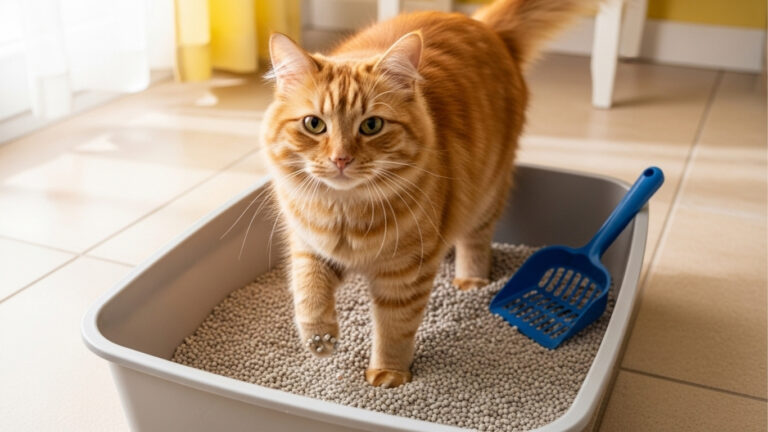
Imagine you’re enjoying your morning coffee, your cat hops on your lap for a snuggle, and bam! You spot something squirmy near her tail. You freeze. She purrs. And suddenly, you’re Googling “how long does it take for cat dewormer to work” before your coffee cools.
If you’re here, chances are you’ve had a similar shock. Whether you’re a first-time cat parent or a seasoned pro, discovering worms in your feline friend is well, less than charming. But don’t panic. Worms are a common issue; thankfully, modern dewormers are highly effective when used correctly.
In this guide, we’re breaking down exactly how long it takes for cat dewormer to work, what to expect after treatment, and how to keep your kitty parasite-free (without losing your sanity or your rug).
Contents
- 1 What Are Cat Dewormers, and How Do They Work?
- 2 So, How Long Does It Take for Cat Dewormer to Work?
- 3 What to Expect After Deworming Your Cat?
- 4 Deworming on a Budget: Affordable Options That Work
- 5 Preventing Future Worm Invasions
- 6 FAQs: How Long Does It Take for Cat Dewormer to Work?
- 7 Experts Thoughts: How Long Does It Take for Cat Dewormer to Work?
- 8 Share Your Story!
- 9 About the Author
What Are Cat Dewormers, and How Do They Work?
Before diving into the ticking clock of worm eviction, let’s understand the basics.
Cat dewormers are medications formulated to target and eliminate intestinal parasites such as:
- Roundworms
- Tapeworms
- Hookworms
- Whipworms
Each type of worm responds to different active ingredients, so it’s essential to choose (or have your vet choose) the right formula. Dewormers can be:
- Oral tablets or liquids
- Topical treatments
- Injections (usually administered by a vet)
They work by either paralyzing or destroying the worms, making it easier for your cat’s body to flush them out through the digestive system – yes, that means you’ll likely see some wormy guests in the litter box.
So, How Long Does It Take for Cat Dewormer to Work?
Short answer: Most cat dewormers start working within 24 to 48 hours.
But the full answer depends on a few key factors:
1. Type of Worm
- Roundworms often clear up within 24 hours of treatment.
- Depending on the product, tapeworms may take 24–72 hours to pass.
- Hookworms and whipworms can be more stubborn, sometimes requiring a second dose a few weeks later.
2. Type of Dewormer
- Fast-acting oral meds (like pyrantel pamoate or praziquantel) often start working within hours.
- Natural or herbal options may take longer, up to a few days, and often require repeated dosing.
3. Severity of the Infestation
- A light worm load might clear with one dose.
- A heavy infestation? Expect multiple rounds of treatment over several weeks.
Pro Tip: Always follow up with your vet. A fecal exam 2–3 weeks after treatment helps confirm the worms are completely gone.
Read More: Why Does My Dog Scratch His Bed? 7 Common Reasons
What to Expect After Deworming Your Cat?
1. Visible Worms in Poop
Yes, this is gross, but also a good sign. It means the medicine is working. You may see whole or fragmented worms in your cat’s litter box.
2. Mild Digestive Upset
Some cats experience:
- Diarrhea
- Mild nausea
- A temporary loss of appetite
These symptoms usually fade within a day or two. If they persist, call your vet.
3. Behavioral Changes
Many cats feel perkier after deworming. Worms sap nutrients, so your cat may suddenly act more energetic and bossier than usual once they’re gone.
Natural Dewormer Options (and Do They Work?)
If you lean toward eco-friendly or holistic options, you might be tempted by herbal dewormers. Ingredients like pumpkin seeds, diatomaceous earth, and wormwood are often touted as natural worm-fighters.
The reality?
- Some natural remedies can help prevent re-infestation or support digestive health.
- However, they aren’t as fast or reliable as vet-approved dewormers for an active infestation.
Bottom line: Natural options are great for prevention or as a supplement, but for active worms, go with what your vet recommends.
Deworming on a Budget: Affordable Options That Work
Let’s face it vet visits can add up. But skipping deworming isn’t the answer. Affordable, vet-approved options do exist, including:
- Over-the-counter tablets with proven ingredients (check reviews and vet endorsements)
- Chewy and Amazon often offer discounts on trusted brands
- Local animal shelters or clinics sometimes provide low-cost treatment
Tip: Avoid super-cheap, no-name brands. Always read the active ingredients and check if the product targets your cat’s worm type.
Preventing Future Worm Invasions
Once you’ve kicked the worms to the curb, here’s how to keep them from returning:
✅ Regular Flea Control
Tapeworms often come from fleas. Control the fleas, and you reduce the risk of worms.
✅ Clean Litter Boxes Daily
Remove feces promptly to prevent egg transmission.
✅ Deworm on a Schedule
Cats that go outdoors (or live with dogs) may need deworming every 3–6 months.
✅ Keep Raw Meat Off the Menu
Undercooked meat can carry parasites, so no table scraps!
Read More: How to Open Tidy Cats Litter Bucket (Without Losing Your Cool)
FAQs: How Long Does It Take for Cat Dewormer to Work?
1. Can I see worms after deworming my cat?
Yes! You may see dead or moving worms in your cat’s stool within 24–48 hours. It’s gross, but it’s a sign that the meds are doing their job.
2. Should I treat my cat again after the first dose?
Sometimes. Follow-up doses may be needed, especially for hookworms or whipworms. Your vet may recommend a second dose after 2–3 weeks.
3. Is it safe to deworm a kitten?
Absolutely but only with kitten-safe medications. Kittens can be dewormed as early as 2 weeks old. Always check with your vet for the right dosage.
4. How often should indoor cats be dewormed?
Even indoor cats can get worms. Depending on your vet’s advice, deworming is often recommended every 6–12 months.
5. Can I use dog dewormer for my cat?
Nope! Cat and dog dewormers are formulated differently, and using the wrong one could be dangerous. Always use species-specific medications.
Experts Thoughts: How Long Does It Take for Cat Dewormer to Work?
In most cases, cat dewormers begin working within 24 to 48 hours, and full elimination takes a few days to a couple of weeks, depending on the worm type and treatment used.
The key? Use the proper medication, monitor your cat, and follow through with any necessary follow-ups.
Worms might be creepy, but they’re totally beatable and your cat deserves to feel her best (while proudly parading her fluff all over your couch).
Have you had to deworm your cat recently? Did you see results fast, or did it take multiple rounds? Drop a comment and share your experience to help other cat parents!







